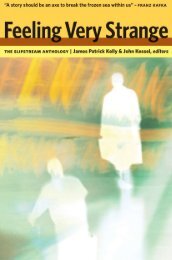The Curse of the Wer.. - Site de Thomas - Free
The Curse of the Wer.. - Site de Thomas - Free
The Curse of the Wer.. - Site de Thomas - Free
You also want an ePaper? Increase the reach of your titles
YUMPU automatically turns print PDFs into web optimized ePapers that Google loves.
28 THE CURSE OF THE WEREWOLF<br />
his 1873 article by commenting that ‘[t]here is no more important<br />
duty for our reformers than to take care that vice and ignorance do<br />
not produce those were-wolves <strong>of</strong> mo<strong>de</strong>rn civilization who gnash <strong>the</strong>ir<br />
teeth and glare at us from behind prison-bars or <strong>the</strong> grated windows<br />
<strong>of</strong> lunatic asylums.’ 53<br />
<strong>The</strong> language <strong>of</strong> reason and morality, however, <strong>of</strong>ten contrasted glaringly<br />
with <strong>the</strong> same writers’ apparent relish for sensational material.<br />
Charles Dickens gave characteristically perceptive expression to <strong>the</strong>se<br />
contradictions in a letter to his partner regarding <strong>the</strong> editorial policy<br />
<strong>of</strong> Household Words, writing that <strong>the</strong> material <strong>the</strong>y printed should<br />
be ‘“extraordinary”, “romantic”, or “remarkable”, a gui<strong>de</strong> to public<br />
opinion and “as amusing as possible, but all distinctly and boldly going<br />
to what in one’s own view ought to be <strong>the</strong> spirit <strong>of</strong> <strong>the</strong> people and<br />
<strong>the</strong> time”.’ 54 Just as Dickens seemed to propose, sage cautions about<br />
corporeal indulgence or emotional excess were frequently intermingled<br />
with lavish <strong>de</strong>scriptions <strong>of</strong> melodramatic <strong>de</strong>eds or mur<strong>de</strong>rous atrocities.<br />
Young’s moralizing conclusion to his article, for example, conclu<strong>de</strong>s<br />
several columns <strong>of</strong> explicitly <strong>de</strong>scribed abominations, couched in <strong>the</strong><br />
most colourful and emotive language. 55<br />
O<strong>the</strong>r moralists were more doggedly opposed to <strong>the</strong> circulation <strong>of</strong><br />
sensation literature, but even <strong>the</strong>y found <strong>the</strong>mselves resorting to <strong>the</strong><br />
very tropes <strong>the</strong>y sought to discredit. As Ann Cvetkovich notes, use<br />
<strong>of</strong> <strong>the</strong> metaphor <strong>of</strong> ‘appetite’ for <strong>the</strong> attraction to sensation was not<br />
uncommon amongst its critics, a representation which suggested that<br />
‘<strong>the</strong> sensation novel is <strong>de</strong>plorable because it reduces its rea<strong>de</strong>rs to <strong>the</strong><br />
condition <strong>of</strong> animals who are driven by instincts.’ 56 Echoes <strong>of</strong> <strong>the</strong> type<br />
<strong>of</strong> monstrosity embodied by <strong>the</strong> werewolf consequently found <strong>the</strong>ir way<br />
into characterizations <strong>of</strong> <strong>the</strong> rea<strong>de</strong>rs <strong>of</strong> sensation literature, as in H.L.<br />
Mansel’s ‘Sensation Novels’ (1863), published in Quarterly Review,<br />
which argued that ‘[t]here is something unspeakably disgusting in this<br />
ravenous appetite for carrion, this vulture-like instinct which smells<br />
out <strong>the</strong> newest mass <strong>of</strong> social corruption, and hurries to <strong>de</strong>vour <strong>the</strong><br />
loathsome dainty before <strong>the</strong> scent has evaporated.’ 57 Imagery <strong>of</strong> <strong>the</strong><br />
werewolf was even more pronounced in J. Greenwood’s characterization<br />
<strong>of</strong> <strong>the</strong> writer or publisher <strong>of</strong> sensation literature.





